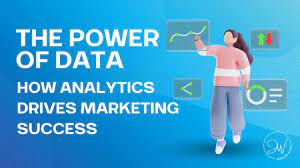In the dynamic landscape of modern business, data has become an invaluable asset, and harnessing its power is crucial for staying competitive. Nowhere is this more evident than in marketing, where data analytics has emerged as a game-changer. From understanding customer behavior to optimizing campaigns, the integration of data analytics has transformed marketing strategies. In this article, we’ll explore the profound impact of data analytics on marketing and how businesses can leverage this powerful tool to drive success.
I. Introduction
A. The Evolution of Marketing
Gone are the days of relying solely on intuition and guesswork in marketing. The digital era has ushered in a wealth of data that, when analyzed strategically, provides insights into customer preferences, market trends, and campaign performance.
B. Defining Data Analytics in Marketing
Data analytics in marketing involves the systematic examination of data sets to extract meaningful patterns, trends, and insights. It encompasses a range of techniques, from basic reporting to advanced predictive modeling, to inform decision-making and enhance marketing strategies.
II. Understanding Customer Behavior
A. Customer Segmentation
Data analytics allows businesses to categorize their customer base into segments based on demographics, behavior, or preferences. This segmentation enables personalized marketing strategies that resonate with specific audience segments.
B. Predictive Analytics
By leveraging historical data, businesses can employ predictive analytics to forecast future customer behavior. This enables proactive decision-making, such as anticipating product demand or identifying potential churn before it occurs.
C. Personalization and Targeting
Personalized marketing has become a cornerstone of successful campaigns. Data analytics enables businesses to tailor content, recommendations, and advertisements to individual preferences, increasing the relevance and effectiveness of marketing efforts.
III. Optimizing Marketing Campaigns
A. Performance Measurement
Data analytics provides real-time insights into the performance of marketing campaigns. Metrics such as click-through rates, conversion rates, and customer acquisition costs help marketers assess the effectiveness of their strategies and make data-driven adjustments.
B. A/B Testing
A/B testing involves comparing two versions of a marketing element to determine which performs better. From email subject lines to website designs, data analytics enables marketers to experiment, analyze results, and refine their approach for optimal impact.
C. Attribution Modeling
Understanding the customer journey is essential for effective marketing. Attribution modeling, facilitated by data analytics, helps businesses identify the touchpoints that contribute most to conversions, guiding resource allocation for maximum impact.
IV. Enhancing Customer Experience
A. Customer Satisfaction Analysis
Data analytics enables businesses to measure and analyze customer satisfaction through feedback, reviews, and surveys. This information is invaluable for identifying areas of improvement and enhancing overall customer experience.
B. Sentiment Analysis
Social media and online platforms provide a wealth of unstructured data. Sentiment analysis, a form of data analytics, helps businesses gauge public opinion about their brand, products, or campaigns, allowing for timely responses and reputation management.
C. Dynamic Pricing
For businesses in e-commerce or service industries, dynamic pricing models can be optimized through data analytics. Analyzing market demand, competitor pricing, and customer behavior allows for strategic pricing adjustments to maximize revenue.
V. Data Security and Compliance
A. Privacy Considerations
As businesses harness customer data for analytics, ensuring privacy and compliance with data protection regulations is paramount. Implementing robust security measures and adhering to ethical data practices build trust with customers and avoid legal repercussions.
B. Transparency in Data Usage
Communicating how customer data is used and stored fosters transparency. Businesses that are clear about their data practices not only comply with regulations but also build trust with their audience, encouraging customer loyalty.
VI. Future Trends in Data Analytics and Marketing
A. Artificial Intelligence (AI) Integration
The integration of AI in data analytics is poised to revolutionize marketing further. AI algorithms can analyze vast datasets at unprecedented speeds, providing deeper insights, predicting trends, and automating marketing processes for efficiency.
B. Predictive Personalization
Advancements in predictive analytics will lead to more sophisticated personalization. Marketers will be able to anticipate individual customer needs and preferences, delivering hyper-personalized experiences that drive engagement and loyalty.
C. Augmented Reality (AR) and Virtual Reality (VR)
AR and VR technologies will create immersive marketing experiences. Data analytics will play a crucial role in optimizing these experiences, ensuring that they align with customer expectations and deliver measurable results.
VII. Conclusion
The power of data analytics in marketing is a transformative force that continues to reshape the industry. From understanding customer behavior to optimizing campaigns and enhancing the overall customer experience, the insights derived from data are invaluable. As technology advances and new trends emerge, businesses that embrace and master data analytics will remain agile, competitive, and well-positioned for success in the ever-evolving world of marketing.
FAQs
- How does data analytics benefit marketing campaigns? Data analytics enhances marketing campaigns by providing insights into customer behavior, enabling performance measurement, optimizing strategies through A/B testing, and guiding personalized and targeted marketing efforts.
- What is the role of predictive analytics in marketing? Predictive analytics in marketing involves forecasting future trends and customer behavior based on historical data. It helps businesses make proactive decisions, such as anticipating demand and identifying potential areas for improvement.
- How can data analytics enhance customer experience? Data analytics enhances customer experience by enabling businesses to analyze customer satisfaction, perform sentiment analysis, and implement dynamic pricing models. This information helps businesses tailor their offerings and interactions to meet customer expectations.
- What are the privacy considerations in data analytics for marketing? Privacy considerations include implementing robust security measures, complying with data protection regulations, and being transparent about how customer data is used and stored. Prioritizing privacy builds trust with customers and ensures legal compliance.
- What are some future trends in data analytics and marketing? Future trends in data analytics and marketing include the integration of artificial intelligence (AI) for deeper insights, predictive personalization for more sophisticated targeting, and the use of augmented reality (AR) and virtual reality (VR) for immersive marketing experiences.

